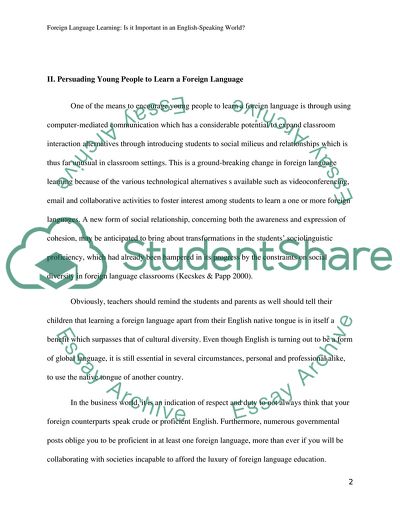Cite this document
(Foreign Language Learning - Is It Important in an English-Speaking Wor Assignment, n.d.)
Foreign Language Learning - Is It Important in an English-Speaking Wor Assignment. https://studentshare.org/english/1723343-because-of-the-widespread-use-of-english-nowadays-a-major-concern-in-english-speaking-countries-is-how-to-persuade-young-people-of-the-benefits-of-learning-other-languages-to-what-extent-do-those-whose-mother-tongue-is-english-need-to-learn-other-langua
Foreign Language Learning - Is It Important in an English-Speaking Wor Assignment. https://studentshare.org/english/1723343-because-of-the-widespread-use-of-english-nowadays-a-major-concern-in-english-speaking-countries-is-how-to-persuade-young-people-of-the-benefits-of-learning-other-languages-to-what-extent-do-those-whose-mother-tongue-is-english-need-to-learn-other-langua
(Foreign Language Learning - Is It Important in an English-Speaking Wor Assignment)
Foreign Language Learning - Is It Important in an English-Speaking Wor Assignment. https://studentshare.org/english/1723343-because-of-the-widespread-use-of-english-nowadays-a-major-concern-in-english-speaking-countries-is-how-to-persuade-young-people-of-the-benefits-of-learning-other-languages-to-what-extent-do-those-whose-mother-tongue-is-english-need-to-learn-other-langua.
Foreign Language Learning - Is It Important in an English-Speaking Wor Assignment. https://studentshare.org/english/1723343-because-of-the-widespread-use-of-english-nowadays-a-major-concern-in-english-speaking-countries-is-how-to-persuade-young-people-of-the-benefits-of-learning-other-languages-to-what-extent-do-those-whose-mother-tongue-is-english-need-to-learn-other-langua.
“Foreign Language Learning - Is It Important in an English-Speaking Wor Assignment”. https://studentshare.org/english/1723343-because-of-the-widespread-use-of-english-nowadays-a-major-concern-in-english-speaking-countries-is-how-to-persuade-young-people-of-the-benefits-of-learning-other-languages-to-what-extent-do-those-whose-mother-tongue-is-english-need-to-learn-other-langua.


